人工智能讲解英语
- 格式:ppt
- 大小:6.39 MB
- 文档页数:26
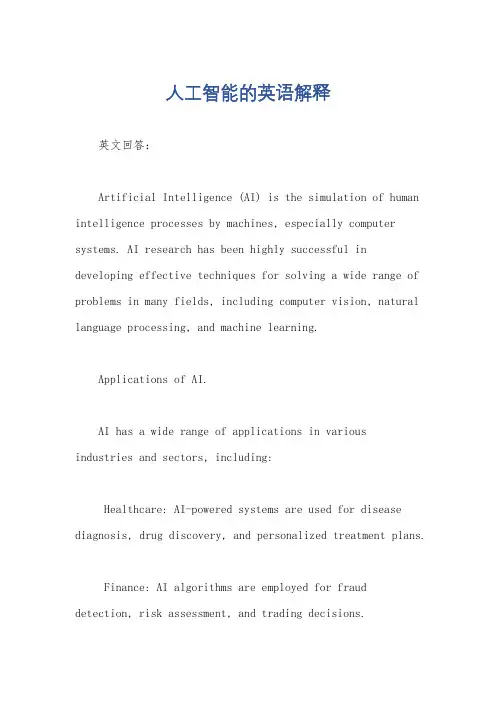
人工智能的英语解释英文回答:Artificial Intelligence (AI) is the simulation of human intelligence processes by machines, especially computer systems. AI research has been highly successful in developing effective techniques for solving a wide range of problems in many fields, including computer vision, natural language processing, and machine learning.Applications of AI.AI has a wide range of applications in variousindustries and sectors, including:Healthcare: AI-powered systems are used for disease diagnosis, drug discovery, and personalized treatment plans.Finance: AI algorithms are employed for fraud detection, risk assessment, and trading decisions.Transportation: AI is used for autonomous driving, traffic management, and route optimization.Manufacturing: AI techniques are utilized for predictive maintenance, process optimization, and quality control.Retail: AI systems are used for personalized recommendations, demand forecasting, and inventory management.Types of AI.AI can be categorized into different types based on the level of intelligence and autonomy exhibited by the system:Reactive Machines: These AI systems react to the current environment without the ability to learn or remember past experiences.Limited Memory: AI systems with limited memory canstore past experiences and use them to inform current decisions.Theory of Mind: These AI systems can understand the mental states of other entities, such as beliefs, desires, and intentions.Self-Awareness: AI systems with self-awareness are able to reflect on their own thoughts and actions.Benefits of AI.The adoption of AI technology offers numerous potential benefits, such as:Efficiency: AI systems can automate repetitive and time-consuming tasks, freeing up human workers for more complex and creative endeavors.Accuracy: AI algorithms can process large volumes of data and extract patterns and insights that are difficult for humans to identify.Consistency: AI systems can consistently perform tasks without the errors or biases that can affect humandecision-making.Innovation: AI technology drives innovation by enabling the development of new products, services, and processes.Economic Growth: AI has the potential to contribute to economic growth by increasing productivity and creating new job opportunities.Challenges of AI.While AI holds great promise, it also presents several challenges that need to be addressed:Job Displacement: AI systems can displace human workers in certain job roles, raising concerns about unemployment.Bias: AI algorithms can inherit biases from the data they are trained on, leading to unfair or discriminatory outcomes.Security: AI systems can be vulnerable to hacking and misuse, potentially leading to security breaches.Ethics: The rapid advancement of AI raises ethical questions about the responsible development and use of AI technology.Future of AI.The future of AI is highly anticipated, with researchers and industry leaders envisioning a world where AI systems seamlessly collaborate with humans to solve complex problems and enhance human capabilities. As AI technology continues to evolve, it is expected to play an increasingly significant role in shaping the future of society and the economy.中文回答:什么是人工智能?人工智能(AI)是指机器(尤其是计算机系统)模拟人类智能过程的能力。
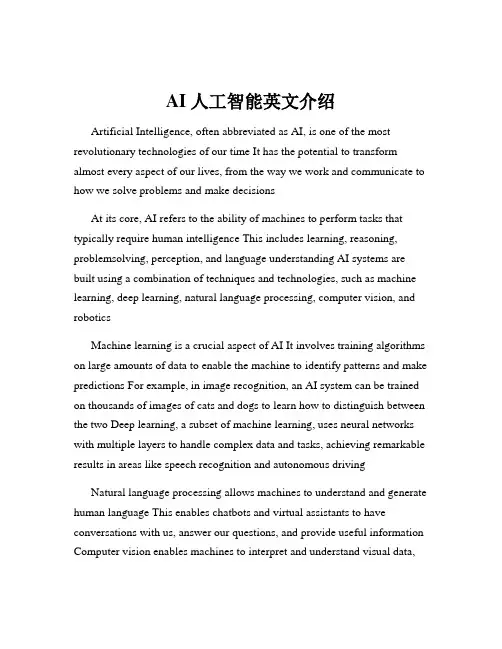
AI 人工智能英文介绍Artificial Intelligence, often abbreviated as AI, is one of the most revolutionary technologies of our time It has the potential to transform almost every aspect of our lives, from the way we work and communicate to how we solve problems and make decisionsAt its core, AI refers to the ability of machines to perform tasks that typically require human intelligence This includes learning, reasoning, problemsolving, perception, and language understanding AI systems are built using a combination of techniques and technologies, such as machine learning, deep learning, natural language processing, computer vision, and roboticsMachine learning is a crucial aspect of AI It involves training algorithms on large amounts of data to enable the machine to identify patterns and make predictions For example, in image recognition, an AI system can be trained on thousands of images of cats and dogs to learn how to distinguish between the two Deep learning, a subset of machine learning, uses neural networks with multiple layers to handle complex data and tasks, achieving remarkable results in areas like speech recognition and autonomous drivingNatural language processing allows machines to understand and generate human language This enables chatbots and virtual assistants to have conversations with us, answer our questions, and provide useful information Computer vision enables machines to interpret and understand visual data,which is essential for applications like facial recognition, object detection, and autonomous vehiclesAI has already made significant impacts in various fields In healthcare, it is used for disease diagnosis, drug discovery, and personalized treatment plans In finance, it helps with fraud detection, risk assessment, and investment decisions In transportation, selfdriving cars and intelligent traffic management systems are being developed Even in entertainment, AI is used to create personalized recommendations and generate realistic virtual charactersHowever, the development of AI also brings some challenges and concerns One of the main concerns is the potential impact on employment As AI automates certain tasks, some jobs may become obsolete, requiring workers to upskill and reskill to adapt to the changing job market Ethical and moral issues also arise, such as bias in algorithms, privacy concerns, and the use of AI in warfareAnother challenge is the interpretability and transparency of AI systems Some AI algorithms are so complex that it is difficult to understand how they arrive at certain decisions, which can lead to trust issues Ensuring that AI is developed and used in an ethical and responsible manner is crucialDespite these challenges, the potential benefits of AI are too great to ignore With continued research and development, AI has the potential to solve some of the world's most pressing problems, such as climate change, disease prevention, and resource managementIn conclusion, AI is a powerful technology that holds both great promise and potential risks As we move forward, it is essential that we approach itsdevelopment and application with caution, ensuring that it benefits humanity as a whole We need to strike a balance between innovation and ethical considerations to shape a future where AI works for the betterment of our society。

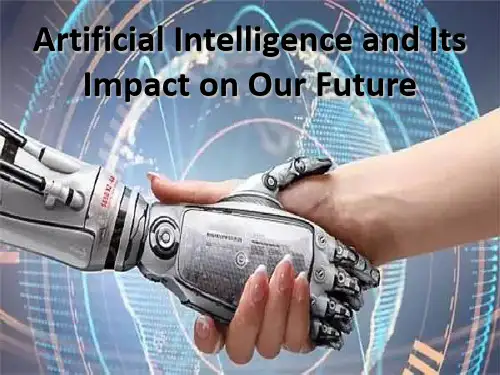
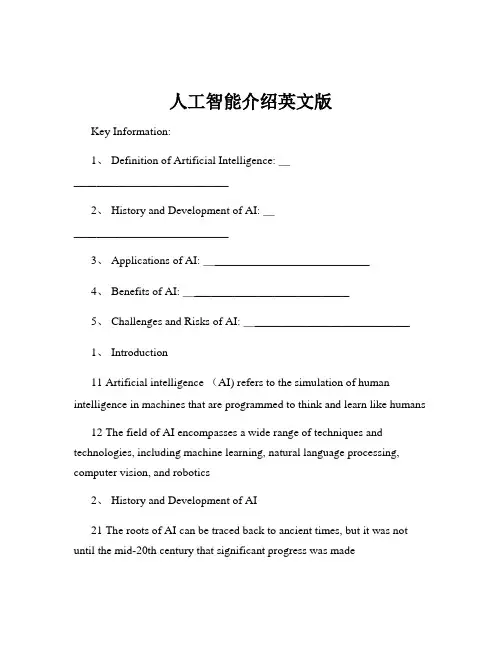
人工智能介绍英文版Key Information:1、 Definition of Artificial Intelligence: ____________________________2、 History and Development of AI: ____________________________3、 Applications of AI: ____________________________4、 Benefits of AI: ____________________________5、 Challenges and Risks of AI: ____________________________1、 Introduction11 Artificial intelligence (AI) refers to the simulation of human intelligence in machines that are programmed to think and learn like humans12 The field of AI encompasses a wide range of techniques and technologies, including machine learning, natural language processing, computer vision, and robotics2、 History and Development of AI21 The roots of AI can be traced back to ancient times, but it was not until the mid-20th century that significant progress was made22 In the 1950s, the concept of AI was formally introduced, and early research focused on developing algorithms for problemsolving and decisionmaking23 Over the years, advancements in computing power, data availability, and algorithmic improvements have led to significant breakthroughs in AI3、 Applications of AI31 Healthcare311 AI is used in medical diagnosis, drug discovery, and patient monitoring312 Machine learning algorithms can analyze large amounts of medical data to identify patterns and predict diseases32 Finance321 In the financial sector, AI is employed for fraud detection, risk assessment, and investment decisionmaking322 Automated trading systems use AI to make rapid and informed trading decisions33 Transportation331 Selfdriving cars and intelligent transportation systems rely on AI for navigation and traffic management332 AI can optimize routes and improve the efficiency of public transportation4、 Benefits of AI41 Increased Efficiency and Productivity411 AIpowered systems can perform tasks faster and more accurately than humans, leading to improved operational efficiency412 Automation of repetitive tasks frees up human resources for more complex and creative work42 Improved DecisionMaking421 By analyzing large amounts of data, AI can provide valuable insights and predictions to support decisionmaking processes422 Businesses and organizations can make more informed and strategic decisions based on AIdriven analytics43 Enhanced Customer Experience431 AIpowered chatbots and virtual assistants offer 24/7 customer service, providing quick and accurate responses432 Personalized recommendations based on AI algorithms enhance the customer experience and increase customer satisfaction5、 Challenges and Risks of AI51 Ethical and Moral Concerns511 Issues such as bias in algorithms, data privacy, and the potential for autonomous weapons raise ethical questions512 Ensuring that AI is developed and used in an ethical and responsible manner is crucial52 Job Displacement521 The automation of certain jobs by AI may lead to unemployment and the need for workforce reskilling and upskilling522 However, new job opportunities are also emerging in the field of AI and related technologies53 Security Risks531 AI systems can be vulnerable to cyberattacks and malicious use532 Safeguarding AI infrastructure and data is essential to prevent security breaches6、 Conclusion61 AI has the potential to bring significant benefits and transform various aspects of our lives62 However, it is essential to address the challenges and risks associated with its development and use to ensure a positive impact on society63 Continued research and ethical considerations will be crucial in shaping the future of AI。
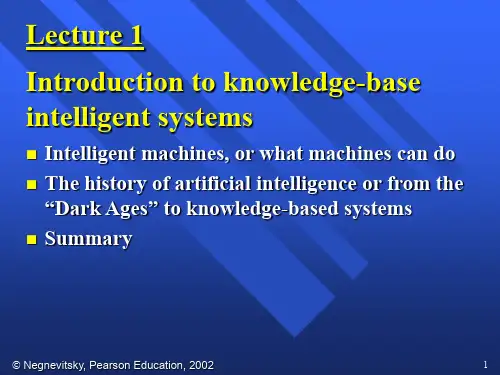


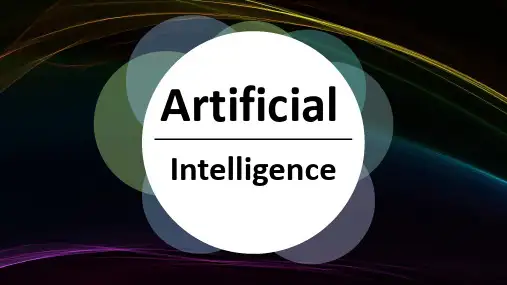

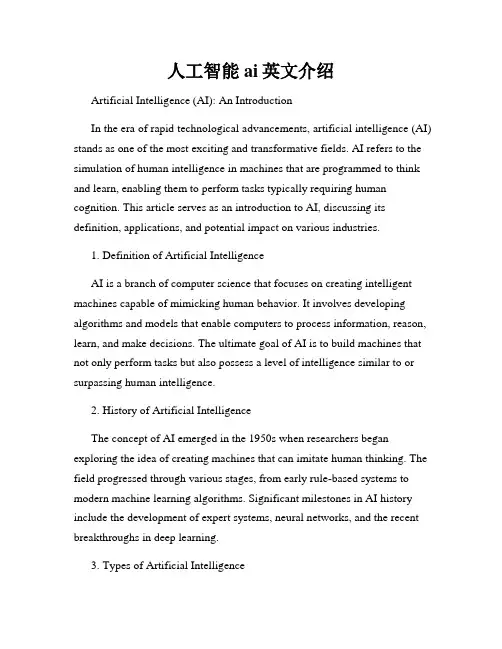
人工智能ai英文介绍Artificial Intelligence (AI): An IntroductionIn the era of rapid technological advancements, artificial intelligence (AI) stands as one of the most exciting and transformative fields. AI refers to the simulation of human intelligence in machines that are programmed to think and learn, enabling them to perform tasks typically requiring human cognition. This article serves as an introduction to AI, discussing its definition, applications, and potential impact on various industries.1. Definition of Artificial IntelligenceAI is a branch of computer science that focuses on creating intelligent machines capable of mimicking human behavior. It involves developing algorithms and models that enable computers to process information, reason, learn, and make decisions. The ultimate goal of AI is to build machines that not only perform tasks but also possess a level of intelligence similar to or surpassing human intelligence.2. History of Artificial IntelligenceThe concept of AI emerged in the 1950s when researchers began exploring the idea of creating machines that can imitate human thinking. The field progressed through various stages, from early rule-based systems to modern machine learning algorithms. Significant milestones in AI history include the development of expert systems, neural networks, and the recent breakthroughs in deep learning.3. Types of Artificial IntelligenceAI can be categorized into two main types: Narrow AI and General AI. Narrow AI, also known as Weak AI, refers to AI systems designed for specific tasks, such as voice assistants or autonomous vehicles. General AI, on the other hand, represents a hypothetical form of AI that possesses the ability to understand, learn, and perform any intellectual task that a human being can do.4. Applications of Artificial IntelligenceAI has found applications across various industries and domains. In healthcare, AI is utilized for medical diagnosis, drug discovery, and personalized treatment plans. In finance, AI is used for algorithmic trading, fraud detection, and risk assessment. Other sectors benefiting from AI include transportation, manufacturing, customer service, and agriculture.5. Impact of Artificial Intelligence on SocietyThe widespread adoption of AI brings both opportunities and challenges. On one hand, AI has the potential to enhance productivity, automate mundane tasks, and improve decision-making. On the other hand, concerns arise regarding job displacement, ethical implications, and biases in AI systems. Striking a balance between technological progress and societal well-being is a crucial consideration for the future of AI.6. Future Trends in Artificial IntelligenceThe future of AI holds immense potential for advancements. Some emerging trends include the integration of AI with other technologies like Internet of Things (IoT) and robotics, the development of explainable AI for transparency, and the focus on ethical AI design. Continued research anddevelopment will drive further innovation and push the boundaries of what AI can achieve.In conclusion, artificial intelligence is a fascinating field that revolutionizes how machines interact and respond to tasks, rivalling human intelligence. This article provided an overview of AI, discussing its definition, history, types, applications, societal impact, and future trends. As AI continues to evolve, it is essential to ensure its ethical and responsible adoption in order to harness its full potential for the benefit of society.。
人工智能英语基础教程Artificial intelligence, or AI, has become an increasingly prevalent and important topic in today's world. 人工智能,或者AI,在今天的世界中变得越来越普遍和重要。
From improving customer service with chatbots to automating repetitive tasks in industries, AI is transforming the way we live and work. 从利用聊天机器人来提升客户服务到在各行各业自动化重复性任务,人工智能正在改变我们生活和工作的方式。
One of the key aspects of AI is machine learning, where algorithms are used to analyze and learn from data without being explicitly programmed. 人工智能的一个关键方面是机器学习,其中算法用于分析和从数据中学习,而不是被明确地编程。
This allows AI systems to make predictions, recognize patterns, and make decisions based on the information they have been trained on. 这使得人工智能系统能够根据他们接受过的信息进行预测,识别模式并做出决定。
While AI has incredible potential to revolutionize industries and improve efficiency, there are also concerns about its impact on jobs and privacy. 尽管人工智能有着惊人的潜力来彻底改变行业并提高效率,但也有一些对它对就业和隐私的影响的担忧。
ArtificialIntelligence人工智能(AI)英语演讲Artificial IntelligenceNowadays, AI is being used in various fields in everyday life, it has played an important role in our daily life. But many people are even unaware of its usage.What is AI? How does it work in our life? T oday, i want to introduce more details about it.AI stands for artificial intelligence, the scientists and researchers defined it as the science and engineering of making intelligent machines, and those machines can do things that would require intelligence if done by humans.An AI machine can have a huge amount of knowledge, which is different with humans, it won’t forget things, and to make it even better, it will be able to simulate human intelligence, think and reason with such knowledge, and then act like humans.Here are some examples of AI applications.1) Today’s robotics use AI to recognize and most importantly, to react when given a situation;2) With the GPS device, cars can give the shortest possible route to our destination, and also some cars with advanced technology, which can drive us to our location when destination is specified;3) Today’s weather forecast uses AI for weather prediction, by analyzing vast amount of information;4) Many AI systems which have the ability of image face and voice recognition;5) Today’s offline customer support systems,such as Question/Answering systems use AI technology;6) The games we playedare actually applications of AI,theyhave been coded well enough to play with us,and in most cases,they can beat our human players;7) AI can be used in space exploration,and help to collect important information on their own;8) Some complex expert systems can be developed using AI,which help to make proper decisions;9) Natural language processing is also a major field of AI,where the human language is processed in order to enable human computer interaction;10) And there seems to be lots of examples of AI.Generally speaking,AI can benefit us in the following aspects.1) AI machines or technology can improve productivity and efficiency;2) AI has replaced human beings in many aspects of work, especially in dull and repetitive work or dangerous work;3) AI offers much more convenience to human life;4) AI helps to entertain us.All in all,we can’t deny that, AI is of great importantance in nowadays.It is created by human beings.It is not human intelligence,and does not have any living organisms,however,it is used to behave intelligently in complex enviroments,as if it can think and act like humans.And in my opinion, with the continued development of AI technology, more and more intelligent/great machines based on AI systems will be created, and can help to transform the quality of our life in a better way.。